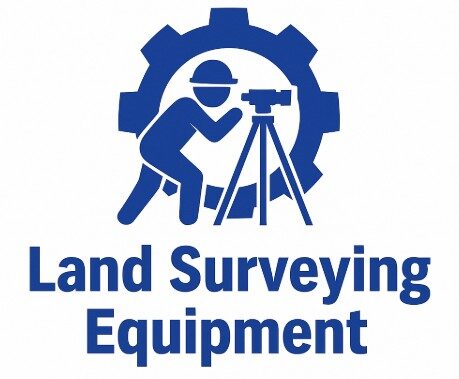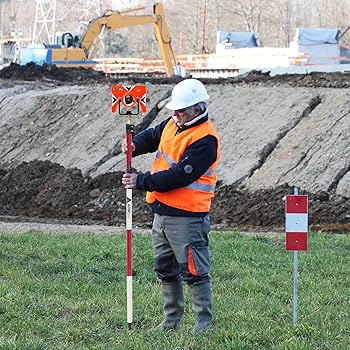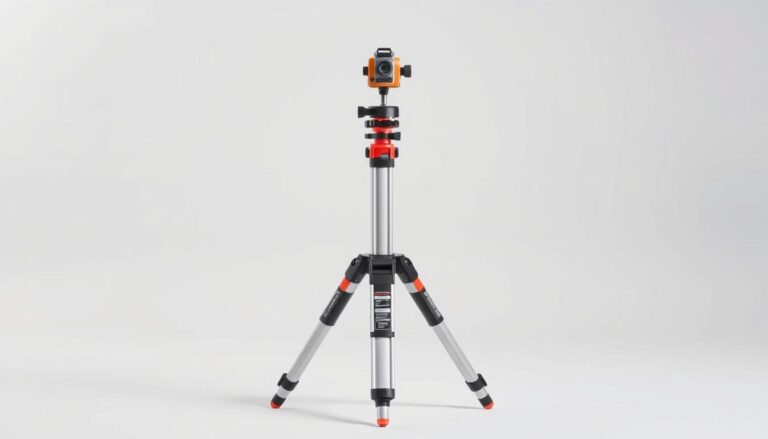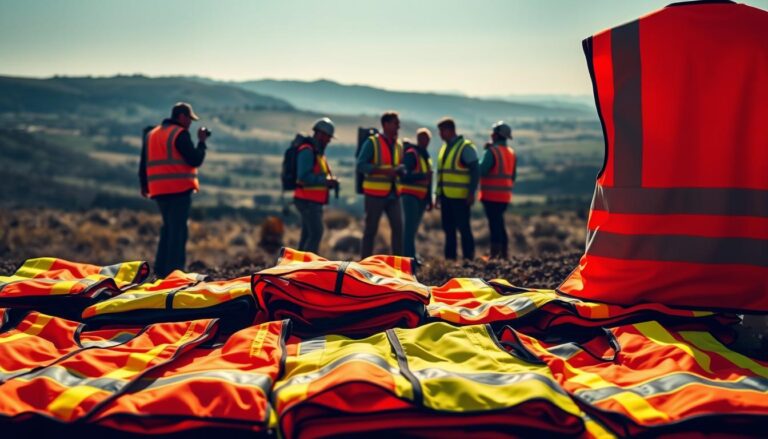Essential Land Surveyors Field Books: Your Guide
For land surveyors, a good field book is key. It keeps track of topographical data, notes, and other important info from fieldwork. Brands like Elan and Sokkia make top-notch field books. They have waterproof bindings and different grid types.
Choosing the right field book is vital for precise data and smooth project work. Think about the binding, paper quality, and grid type. This ensures it fits your surveyor gear needs perfectly.
Key Takeaways
- Reliable field books are essential for land surveyors.
- Look for waterproof bindings and durable materials.
- Various grid types are available to suit different needs.
- Brands like Elan and Sokkia offer high-quality options.
- A good field book enhances data collection accuracy.
The Importance of Quality Field Books in Land Surveying
Quality field books are a cornerstone of accurate land surveying. They are the main tool for recording data during surveys. This data is key for making smart decisions in construction, mapping, and boundary determination. Good record keeping is vital, and field books are made to last in tough environments.
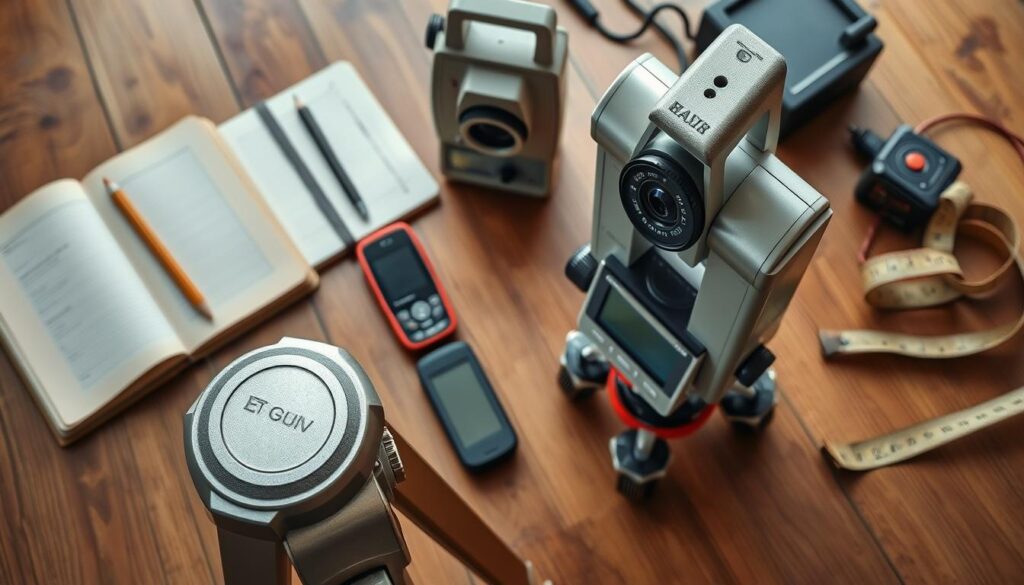
Using quality field books helps surveyors keep accurate records. These books are tough, resisting water and tears. This is crucial for field data collection in all kinds of weather. Professional surveyors count on these tools to keep their data reliable.
Why Professional Surveyors Rely on Specialized Field Books
Professional surveyors need specialized field books because they meet their specific needs. Brands like Elan and Sokkia make field books that help surveyors organize data and last through tough fieldwork.
These field books are key for surveying equipment calibration and data recording. They ensure measurements are captured and stored accurately for later use.
Evolution of Surveying Documentation Tools
The tools for surveying documentation have changed a lot. We’ve moved from old paper systems to more advanced, durable options. Today’s field books are made to be waterproof and tear-resistant, perfect for tough environments.
This change shows the ongoing need for precise and reliable field data collection. As surveying methods and technology improve, so must the tools used for documenting them. This ensures they stay relevant and effective.
Understanding Land Surveyors Field Books: Key Components
Land surveyors need field books with the right components for accuracy and efficiency. These books are crucial for recording and storing field notes. The quality and design of a field book greatly affect a surveying project’s success.
Essential Features for Accuracy and Efficiency
Accuracy and efficiency are key in land surveying. Field books with these features include grid patterns, durable covers, and high-quality paper. Grid patterns help in accurately recording and measuring data. Durable covers protect the book from damage. High-quality paper keeps recordings clear over time.
| Feature | Description | Benefit |
|---|---|---|
| Grid Patterns | Pre-printed grids for data recording | Enhances accuracy in measurements |
| Durable Covers | Water-resistant and rugged covers | Protects the book from environmental damage |
| High-Quality Paper | Paper that resists tearing and fading | Ensures longevity of recorded data |
Paper Quality and Weather Resistance
The paper in field books must withstand various weather conditions. Waterproof paper is a big plus, allowing work in wet conditions without data loss. Permanent ink and rot-proof thread for binding also boost the book’s durability.
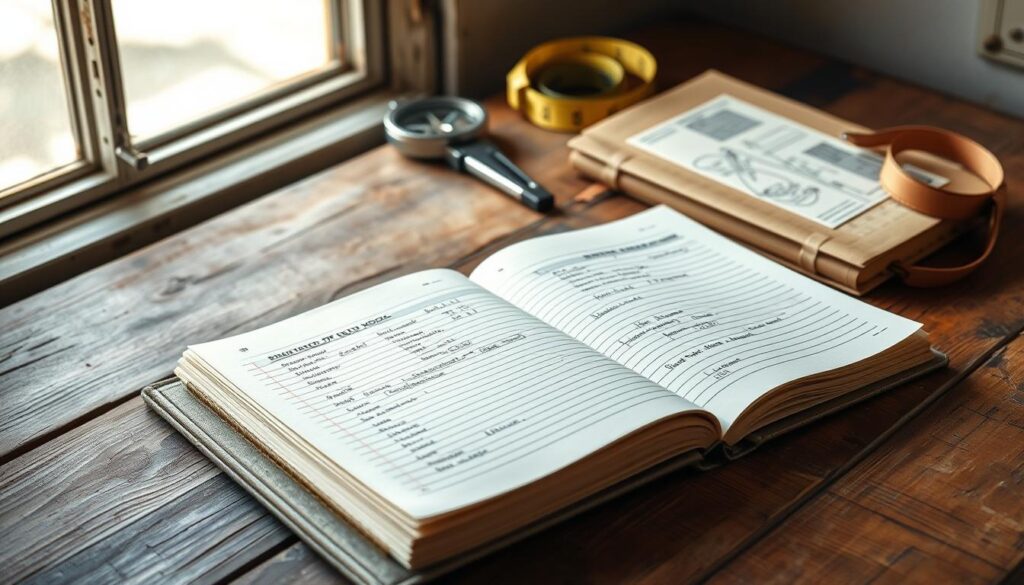
Size and Portability Considerations
The size and portability of a field book matter a lot. Surveyors want books that are easy to carry but still have enough space for data. Finding the right balance between size and portability is essential.
Elan Field Books: Professional-Grade Surveying Companions
Elan is known for making top-quality field books for land surveyors. They focus on durability, accuracy, and ease of use. This makes Elan field books a go-to choice for surveying work.
Elan Field Book Overview
Elan field books are made with the surveyor’s needs in mind. They offer features that make them useful in the field.
Key Features and Specifications
Elan field books have waterproof technology. This keeps your data safe and clear, even in bad weather. They come in different sizes and binding styles to fit your needs.
The pages have a grid pattern for easy data recording. The paper is also made for writing comfort and to last long.
Pros of Elan Field Books
- Durability: Elan field books can handle tough fieldwork.
- Water Resistance: The waterproof tech keeps your data dry in rain, snow, and more.
- Variety of Options: Elan has different sizes and binding styles for your workflow.
Cons of Elan Field Books
Some might find Elan field books priced slightly higher than others. But, the quality and durability make it worth it for many.
| Feature | Description | Benefit |
|---|---|---|
| Waterproof Technology | Pages are treated to resist water | Data remains safe in wet conditions |
| Grid Pattern | Customizable grid for accurate data recording | Enhances precision and reduces errors |
| Binding Options | Various binding styles available | Surveyors can choose the most convenient format |
Elan’s Waterproof Technology
Elan’s waterproof tech is a big plus. It lets surveyors work in any weather without worry. The field book stays usable even when wet.
Binding Options in Elan Field Books
Elan knows surveyors have different binding preferences. So, they offer many options. You can choose sewn bindings for durability or spiral bindings for flexibility.
Who Should Use Elan Field Books
Elan field books are perfect for professional land surveyors. They also work well for students and trainees in surveying. They need durable and accurate field books for their studies and training.
Sokkia Field Books: Precision and Reliability
For surveyors looking for precision and reliability, Sokkia field books are a top pick. Known for high-quality surveying gear, Sokkia’s field books meet the tough demands of recording topographic data.
Sokkia Field Book Overview
Sokkia field books are made with the surveyor’s needs in mind. They offer features that boost accuracy and efficiency in the field. These books are tough, water-resistant, and versatile, fitting various surveying tasks.
Key Features and Specifications
Sokkia field books have several key features that are very useful for surveyors. These include:
- High-quality paper that resists water and tears.
- Variety of grid types for different surveying needs.
- Durable binding that lasts through fieldwork.
Pros of Sokkia Field Books
Using Sokkia field books has many benefits. They offer:
- Enhanced accuracy with clear grid layouts.
- Increased durability due to water-resistant construction.
- Versatility in various surveying tasks.
Cons of Sokkia Field Books
While Sokkia field books are highly valued, some users might find:
- The cost is slightly higher than some other brands.
- Some grid types or customizations are hard to find.
Sokkia’s Grid Types and Page Layouts
Sokkia field books come in a variety of grid types and page layouts. They cater to the different needs of surveyors. Whether it’s topographic, boundary, or other surveys, Sokkia has the right grid for you.
They offer standard grids for general surveys and specialized grids for complex projects. This variety lets surveyors pick the best grid for their needs, improving accuracy and efficiency.
Durability Features of Sokkia Books
Sokkia field books are known for their durability. They’re made with high-quality materials to handle tough field conditions.
The water-resistant paper and strong binding keep the books usable in wet or dusty places. This makes them a reliable choice for surveyors in challenging environments.
Who Should Use Sokkia Field Books
Sokkia field books are great for many surveying professionals. They’re perfect for topographic data recording, boundary surveys, and construction surveys. Their versatility and durability make them a top choice for anyone needing a reliable field book.
Waterproof Field Books: Essential for All Weather Conditions
For surveyors, a waterproof field book is more than just a notebook. It’s a shield against unpredictable weather.
Land surveyors face tough weather conditions. Rain, snow, or moisture can damage their field books. Waterproof field books protect their data from harm.
The Science Behind Waterproof Paper Technology
Waterproof paper uses special materials to keep water out. Chemical treatments and unique manufacturing processes make it possible.
This paper is not just water-resistant. It’s also tough and lasts a long time. This is key for surveyors working in wet or damp places. It keeps their field books usable, even when wet.
- Water resistance comes from chemical treatments.
- Special manufacturing makes it durable.
- The result is a long-lasting, waterproof product.
Comparing Waterproof Options Between Brands
Different brands have their own waterproof field books. Elan and Sokkia are two examples. They both keep water out, but in different ways.
Comparing these brands shows they both make high-quality waterproof field books. But, they differ in how they waterproof and how durable they are.
| Brand | Waterproof Technology | Durability |
|---|---|---|
| Elan | Chemical treatment | High |
| Sokkia | Specialized coating | High |
Maintenance Tips for Maximizing Waterproof Performance
To keep field books waterproof, follow some simple tips.
Make sure the field book is closed when not in use. Stay away from extreme temperatures. And clean the cover often.
- Keep the field book closed when not in use.
- Avoid extreme temperatures.
- Clean the cover regularly.
Field Book Bindings: Finding the Right Fit for Your Needs
The type of binding in a field book greatly affects its durability and usability. Surveyors face many environmental challenges on-site. These can harm the book’s integrity.
There are various binding options, each with its own benefits.
Sewn Bindings: Durability and Longevity
Sewn bindings are known for their durability and longevity. They are perfect for field books used often over time. The sewn binding keeps pages securely attached, even in harsh conditions.
Some key benefits of sewn bindings include:
- High durability
- Long-lasting performance
- Ability to withstand rough handling
Spiral Bindings: Flexibility and Convenience
Spiral bindings offer flexibility and convenience. They make it easier for surveyors to use their field books. The book lies flat when opened, which is handy in the field.
The advantages of spiral bindings include:
- Ease of use
- Flexibility in handling
- Convenient page access
Hard Cover vs. Flexible Cover Options
The choice between hard cover and flexible cover field books depends on the surveyor’s needs. Hard cover books offer more protection. Flexible covers are more portable.
Key considerations include:
- Protection of the field book
- Portability and ease of carrying
- Durability in various conditions
How Binding Choice Affects Field Performance
The binding choice greatly impacts a field book’s performance. Surveyors should think about the type of surveying, environmental conditions, and personal preferences when choosing a binding.
By picking the right binding, surveyors can keep their field books reliable and efficient on projects.
Grid Types in Surveying Field Books
The grid type in a surveying field book is very important. Surveyors look at different grid types to meet their needs. This ensures they can record data well and accurately.
Standard Grid Patterns and Their Applications
Standard grid patterns are common in surveying. They are usually squares or rectangles. These are great for most surveys, like topographic and boundary surveys.
The standard grid makes it easy to take measurements and draw details clearly.
The most common standard grid patterns include:
- 10×10 grid: Good for detailed surveys needing precise measurements.
- 5×5 grid: Ideal for general surveys needing a mix of detail and overview.
Specialty Grids for Specific Surveying Tasks
Specialty grids are for specific tasks. For example, polar grids are for radial surveys. Logarithmic grids are for certain topographic surveys. These grids help surveyors fit their field books to their project needs.
Some examples of specialty grids include:
- Polar coordinate grids for surveys with radial measurements.
- Isometric grids for three-dimensional surveys.
Comparing Grid Options Between Elan and Sokkia
Elan and Sokkia both have various grid types in their field books. Elan field books offer standard and specialty grids. Sokkia field books have many grid types, focusing on precision and durability.
Surveyors should think about their needs when choosing between Elan and Sokkia. Both brands have high-quality options. The right choice depends on the surveying task’s specific needs.
Head-to-Head Comparison: Elan vs. Sokkia Field Books
In land surveying, the right field book is key to a project’s success. Elan and Sokkia provide top-notch choices.
Elan and Sokkia field books are built for surveyors’ tough tasks. Each has unique features that might fit your project better.
Durability and Weather Resistance Comparison
Elan field books stand out with waterproof technology. They’re perfect for surveys in bad weather.
Sokkia field books are also durable. Some have water-resistant covers and grid patterns to keep data safe.
Elan’s waterproof tech gives it an edge in really tough weather.
Value for Money and Cost Analysis
Both Elan and Sokkia field books are good deals. They’re priced well for their quality.
Elan field books are known for lasting long. This can save you money in the long run.
Sokkia field books come in various prices. This makes them available to surveyors with different budgets.
Surveyor Preferences and Field Performance
Surveyors have their own likes when it comes to field books. Some prefer Sokkia’s grid patterns. Others like Elan’s binding options.
Both brands perform well in the field. It’s all about what you need.
Choosing between Elan and Sokkia field books depends on your specific needs and preferences.
Best Practices for Field Book Usage and Care
To keep field data accurate and long-lasting, it’s important to follow best practices. Land surveyors use field books to record important data. It’s crucial to treat these documents with care.
Proper documentation techniques are key to keeping field notes reliable. Here are some essential practices:
- Always use a pencil to record data, as it is easier to erase and correct mistakes.
- Ensure that handwriting is legible and consistent throughout the field book.
- Use standardized symbols and abbreviations to avoid confusion.
- Record data in a timely manner to prevent loss of information.
Proper Documentation Techniques
Clear and accurate documentation is crucial for reliable field data. Surveyors should aim for legible handwriting and standard notations. This improves data quality and makes it easier to review later.
Some important documentation techniques include:
- Using clear and concise language when recording observations.
- Avoiding overwriting or erasing; instead, strike through incorrect entries with a single line.
- Utilizing a consistent format for recording data, such as using grids or templates.
Storage and Preservation Methods
Proper storage and preservation of field books are critical. Surveyors should keep their field books in a dry, cool place, away from direct sunlight.
Some effective storage and preservation methods include:
- Using protective covers or cases to prevent damage.
- Storing field books in an upright position to avoid creasing or bending.
- Avoiding exposure to extreme temperatures or moisture.
By following these best practices, surveyors can keep their field books reliable for years.
Conclusion: Choosing the Right Land Surveyors Field Book
Choosing the right land surveyors field book is key for accurate data and efficient work. Consider the type of surveying, your preferences, and budget. These factors are important when deciding.
Elan and Sokkia field books are top choices in the market. They offer features like waterproof tech, durable bindings, and different grid types. Knowing your project needs will help you pick between them.
By following this guide, you can make a smart choice. Invest in a field book that fits your needs. This ensures you collect precise and reliable data in the field.
